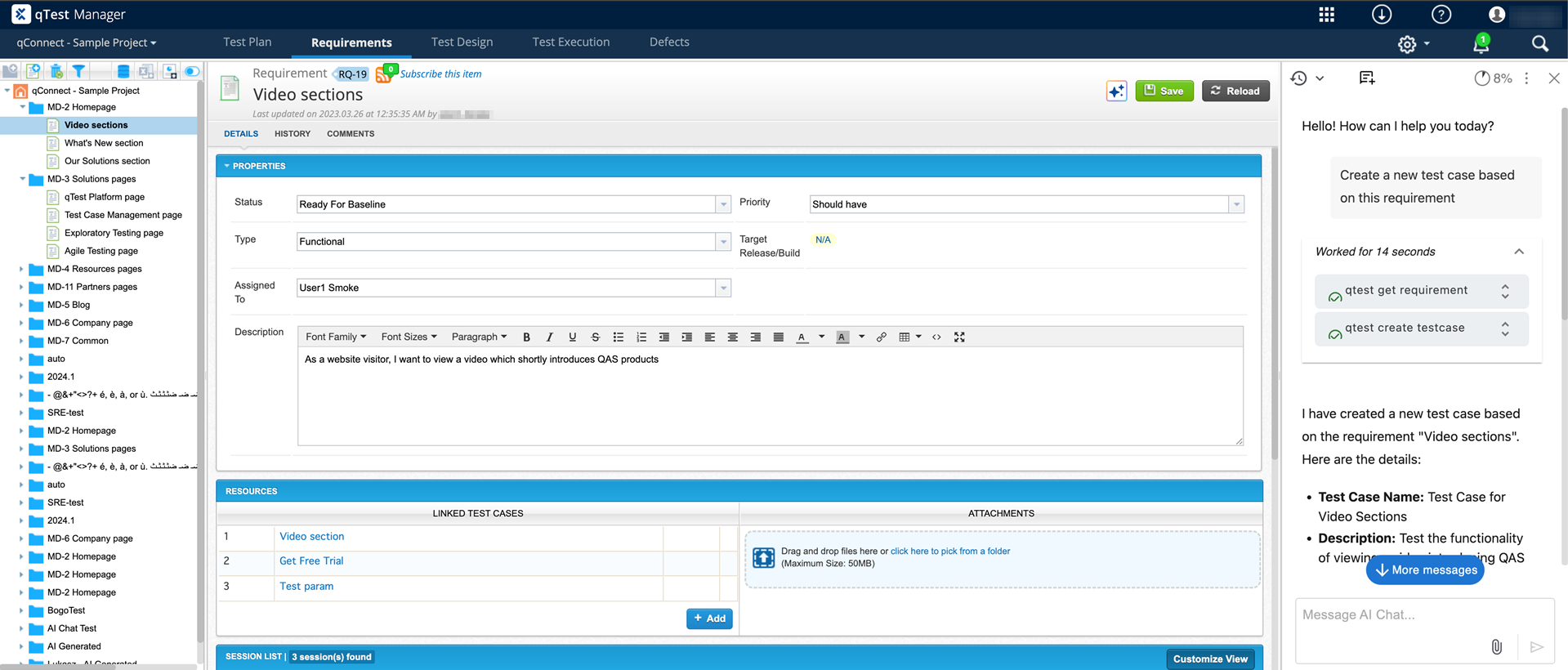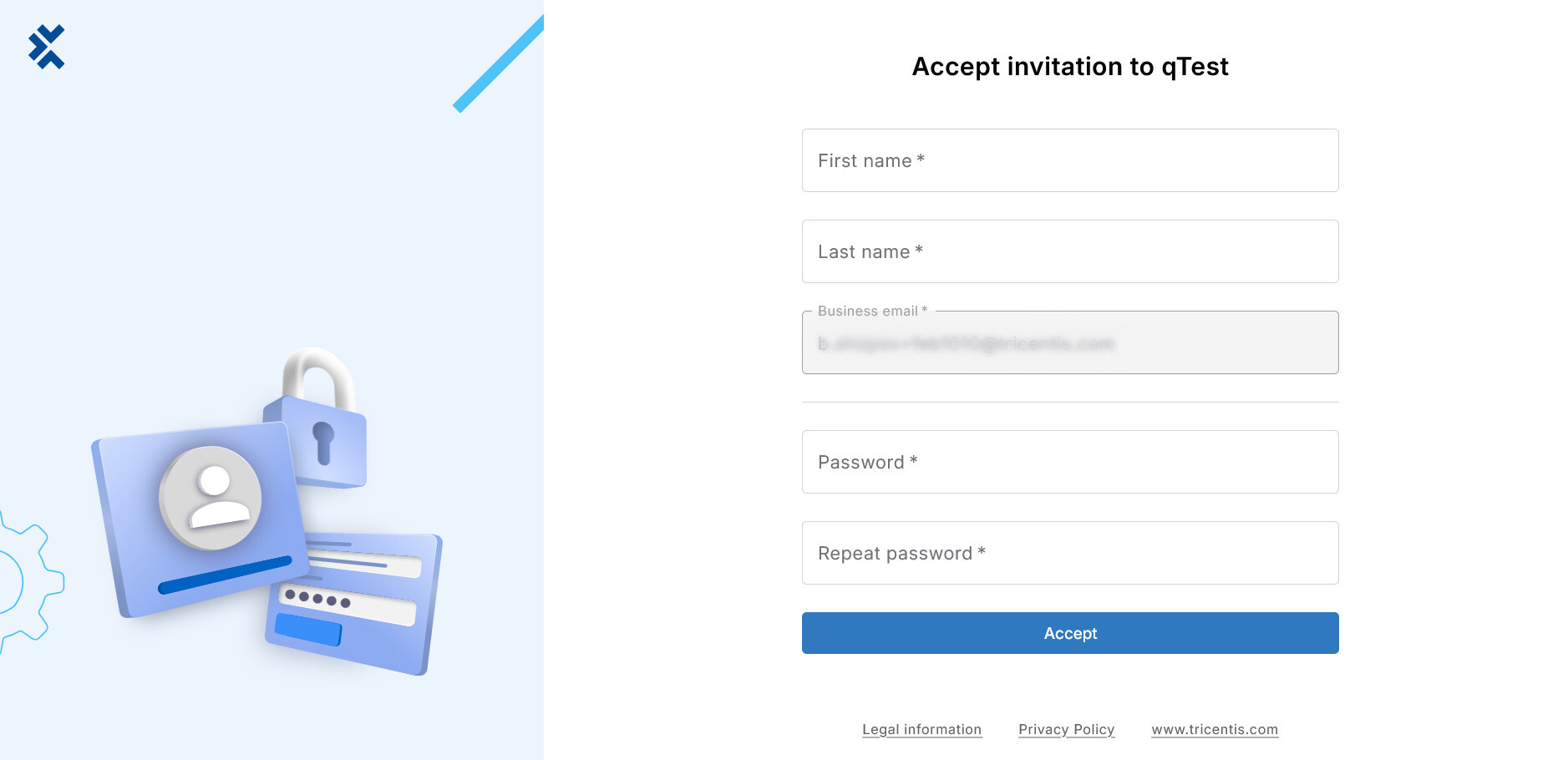What's new in qTest Manager
Discover the latest features and enhancements to improve your experience with qTest.
Note that we're rolling out some features gradually, so they might take a few days to show up in your environment.
Looking for bug fixes? Find them here.
February 2026
Added AI Chat with Agentic Test Creation
We've added our new cross-platform AI Chat to qTest, with the new Agentic Test Creation feature, which you can use to generate detailed test cases from requirements.

After your admin gives you access, you can view the AI chat from any requirement.
With AI Chat, you can work with your test organization in qTest using natural language prompts. In addition to this new tool, we're adding specific agentic tools that you can implement in your test tracking.
Agentic Test Creation is the first of our custom agents available. This agentic service can automatically create test cases from a comprehensive review of your requirements: from the descriptions, to linked test cases, to text attachments. That means the AI agent takes all the existing work on your requirement into account, so you can collaborate with the agent to create specific, applicable test cases.
Learn how you can get started with AI Chat.
Updated custom test step fields
To give you greater flexibility on what information you include and how you organize your test steps, we've increased the amount of custom fields you can add to 5. That means you can add more specific fields according to your testing needs.
For example, if you want to note how critical a test step's failure would potentially be, you can add a Severity if Fails field. Or, you can add an Input Data Source field that notes where the test data is coming from, whether it's mock data, a spreadsheet, or an API. If you use multiple data sets in your testing, you can add a Data Set field, so your testers know which test data applies to that action.
You can still add custom test step fields the same way you did before, but now you can add even more of them.
Updated the MCP
We've added some new tools to the MCP and updated descriptions on existing MCP tools.
Now, you can use the list-attachments to see what files you have attached to a requirement and get-attachment to download those attachment files.
Learn what MCP tools you have available and how to start prompting.
Improved user experience during account setup and maintenance
We've improved the experience for users setting or resetting their passwords with new communication and streamlined user paths.

Our improved onboarding experience makes updating your account more straightforward.
For the Reset Password and Activate User screen, we removed outdated links and provided more information to the user regarding password rules. Note that these changes will be fully released to all users in March, so you may not see the new screens immediately.
Learn how to send activation links to users or how to manage user passwords.
Added support for shared Jira OAuth 2.0 apps for non-service accounts
We've added support for shared Jira OAuth 2.0 apps, so different Jira and qTest admins can set up integrations without a single shared admin account.
Learn how to connect your qTest instance with Jira Cloud or Jira Data Center.
January 2026
Added support for Jira OAuth 2.0
To align with Atlassian's security updates as they deprecate OAuth 1.0a, we've added support for OAuth 2.0 authentication with Jira.
While OAuth 1.0a is still available as an authentication method at the moment, we strongly recommend moving to OAuth 2.0 for the most secure experience, as Atlassian deprecated OAuth 1.0a. You can also continue to authenticate with API tokens for Cloud and Personal Access Tokens for Server or Data Center connections.
Learn how to connect your qTest instance with Jira Cloud or Jira Data Center.
Removed Firefox plugin
We've deprecated and removed download links for the Firefox qTest plugin from the qTest Integration Browser Plugins section in Download qTest Resources.
To learn more about the deprecation, please refer to our end of support announcement.
To download this plugin for Google Chrome or Microsoft Edge go to our downloads page.
December 2025
API updates
We've added a limit to the /api/v3/projects/{projectId}/search API call, so users can only query a maximum of 200 parameters per request. This is to ensure the API has the memory to process your requests.
Learn more about the qTest API on Swagger (opens in new tab).
Security updates
We made background changes to improve the overall security of qTest Manager.
November 2025
Security updates
We made background changes to improve the overall security of qTest Manager.
October 2025
Updated test case display behavior in Jira
When the Tracking Test Case - Requirement Link Per Test Case Version setting is On, the qTest Test Execution iframe in Jira now displays all test case versions and their associated test runs. Unlinked test cases are only displayed in Jira if they have associated test executions that occurred before they were unlinked.
Learn more about how you can adjust Test Case Settings.
September 2025
MCP updates
As part of our updates the new qTest MCP, we've added improved search functions. Now, you can search your requirements, test cases, and test runs with the qTest MCP, even if you don't have the object ID.
Now, you can search for the following objects, even if you don't have an object ID:
-
Requirements
-
Test cases
-
Test runs
-
Releases
-
Test suites
-
Test cycles
-
Builds
-
Defects
Learn more about how to prompt the qTest MCP.
Updates to qTest Search
To improve your search experience in the qTest application, we're changing our search provider from ElasticSearch to PostgresSearch.
We're gradually rolling out this feature with a focus on performance to ensure that you can continue your work without any interruptions. As a SaaS user, you won't see any changes to your search functions throughout the switch.
Learn more about how you can use our search tools to find the objects you need.
Security updates
We made background changes to improve the overall security of qTest Manager.
Known issues
The Search function may not return existing test suites or test runs if you search for them by name. Don't worry, we're working on a fix.
August 2025
We've brought Manager 2025.5 with a few security updates and bugfixes. You can find a list of all the issues we've fixed on our new bug fixes topic.
MCP updates
We added support for searching submodules with the qTest MCP, in addition to top-level modules.
Learn more about how to prompt the qTest MCP.
API updates
We added the new one-time password field to the Add a new Jira connection API call in our documentation.
Learn more on Swagger (opens in new tab).
Security updates
We made background changes to improve the overall security of qTest Manager.
July 2025
Securely connect with support
Need help in qTest? We've introduced a secure and federated sign-in method for Tricentis Support. If you need our hands-on help, your customer support representative can sign-in to your qTest instance to see it from your perspective. All you need to do is select the Enable Support Login checkbox in Security, then assign the support@tricentis.com account the necessary access and privileges for the project you want support to view.
Don't worry, the support user won't affect your license count.

Enable or disable support login with one checkbox.
Once you've gotten the help you need, just clear the checkbox, and we won't have access to your instance anymore.
Learn how to give support access to your qTest instance.
New MCP Server version
We've updated the qTest MCP to a Typescript server in order to support HTTP Streaming. We've also added more actions, so you and your AI assistant can do more together.
You'll need to update the URL you use to connect to the MCP. Learn how to connect to the MCP.
Choose whether to notify users added to a project through the API
We've added a new skipEmailNotifications parameter to the POST /api/v3/users/projects API, which allows you to choose whether or not to send a notification email when you add a user to the project.
Learn more on Swagger (opens in new window).
Security updates
-
We made background changes to improve the overall security of qTest Manager.
-
We made some changes to qTest-Tosca authorization requirements, which improves the security of all calls to Tosca. Learn how to connect qTest and Tosca.
June 2025
Cancel Project cloning
We've made it so you can clone only one project at a time across your qTest instance.
If you start cloning a project, you can cancel it at any point. Canceling the process deletes the clones copy, but the original one remains available.
Learn more about cloning projects.
Icon refresh
We updated the icons and favicons throughout qTest Manager and the satellite applications to align with the Tricentis brand.
![]()
Same great tools, but with a shinier logo.
Security updates
We made background changes to improve the overall security of qTest Manager.
March 2025
Activate your own SaaS instance
We've enhanced your ability to activate your SaaS instance without external help. Now, you can activate your qTest license from your own instance, whether you're still participating in a qTest trial or your trial has ended.
That means you can connect your license and configure your product at any point, without asking Support for help. Don't worry—we're still here if you need anything.
Learn how to activate your license.
Find your server's region
Now, SaaS users can easily find the name of the region where their qTest instance is hosted, located at the bottom of the screen next to the version information.

Find your region next to the version information, anywhere in qTest.
You can use this information if you need to locate your region's status on the Tricentis Status page (opens in new tab).
Updated Jira Cloud connection process
For a more secure experience, when you set up a new connection to Jira Cloud, you need to add a One-time Password. You'll only need this password for the initial setup, and this is different from the existing Password or Token field.
Learn how to connect to Jira Cloud.
Security updates
We performed some background changes to improve the overall security of qTest Manager.
February 2025
Copilot powered with new LLM
To improve qTest Copilot and get you better results for your generated tests, we've upgraded qTest Copilot to use GPT 4o-Mini.
Read more about what models we use across the Tricentis portfolio (opens in a new window).
Activate your own SaaS instance
Now, you can activate your qTest license from your own instance. That means you can connect your license and configure your product without asking Support for help. Don't worry—we're still here if you need anything.
Learn how to activate your license.
Block executable files from upload
To give you more control over your security, we've added the ability for site admins to block all users from uploading executable files. If you turn on this option, your users will still be able to upload attachments, but qTest will stop them from adding any executable file types. This also prevents users from uploading executable files as attachments through the qTest API.

Block executable files in the Security tab in Administration.
Currently, this setting allows you to block the following file types: .exe, .class, .cmd, .bat, and .bin.
Learn more about how to adjust your Security settings.
Performance updates
We performed some background changes to improve the overall performance of the qTest-Tosca integration.
Security updates
We performed some background changes to improve the overall security of qTest Manager.
Archived release notes
Looking for older release notes? You can find those in our release note archive.